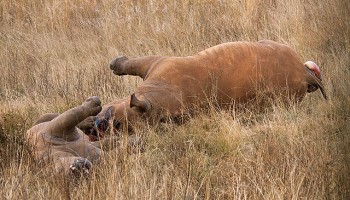The 193 member states undertook to take firmer measures to bring an international collaborative response to globalized wildlife trafficking networks, including implementing strengthened national legislation and enforcement measures and utilizing new technologies to counter crime.
The resolution aims in particular to intensify the prosecution of those involved along the illegal chain, both the supply and demand sides, in order to deter the criminals from pursuing their actions.
Interestingly enough, it was taken the same day as was published a report by the Royal United Services Institute, a British think tank, which called for an enhanced focus on the financial dimension of the issue.
The report points forward that tackling the profits generated by wildlife crimes would undermine the wildlife traffickers' financial motives and thus act as a stronger deterrent power than the threat of imprisonment.
It would in addition allow to curb the funding of future illegal trafficking.
“We’ve gone beyond kicking down the door and looking for animals in the back room, to looking at who’s the kingpin, who’s the transportation coordinator, who ultimately is the vulnerable node in the syndicate without whom the syndicate wouldn’t work,” said Steve Galster, founder of the anti-trafficking Freeland Foundation according to Foxnews.
The report advocates for the use of anti-money laundering techniques and financial investigation traditionally used to uncover drugs smuggling networks or other criminal organizations.
They recommend in particular law enforcement agencies to freeze or seize uncovered criminal proceeds of wildlife crime, recognize wildlife crime as a predicate offence to money laundering and address corruption as a key facilitator.
Similarly, a July report by the Asia-Pacific Group on Money Laundering and the U.N. Office on Drugs and Crime pointed out that the investigators often fail to track down the illicit financial flows.






